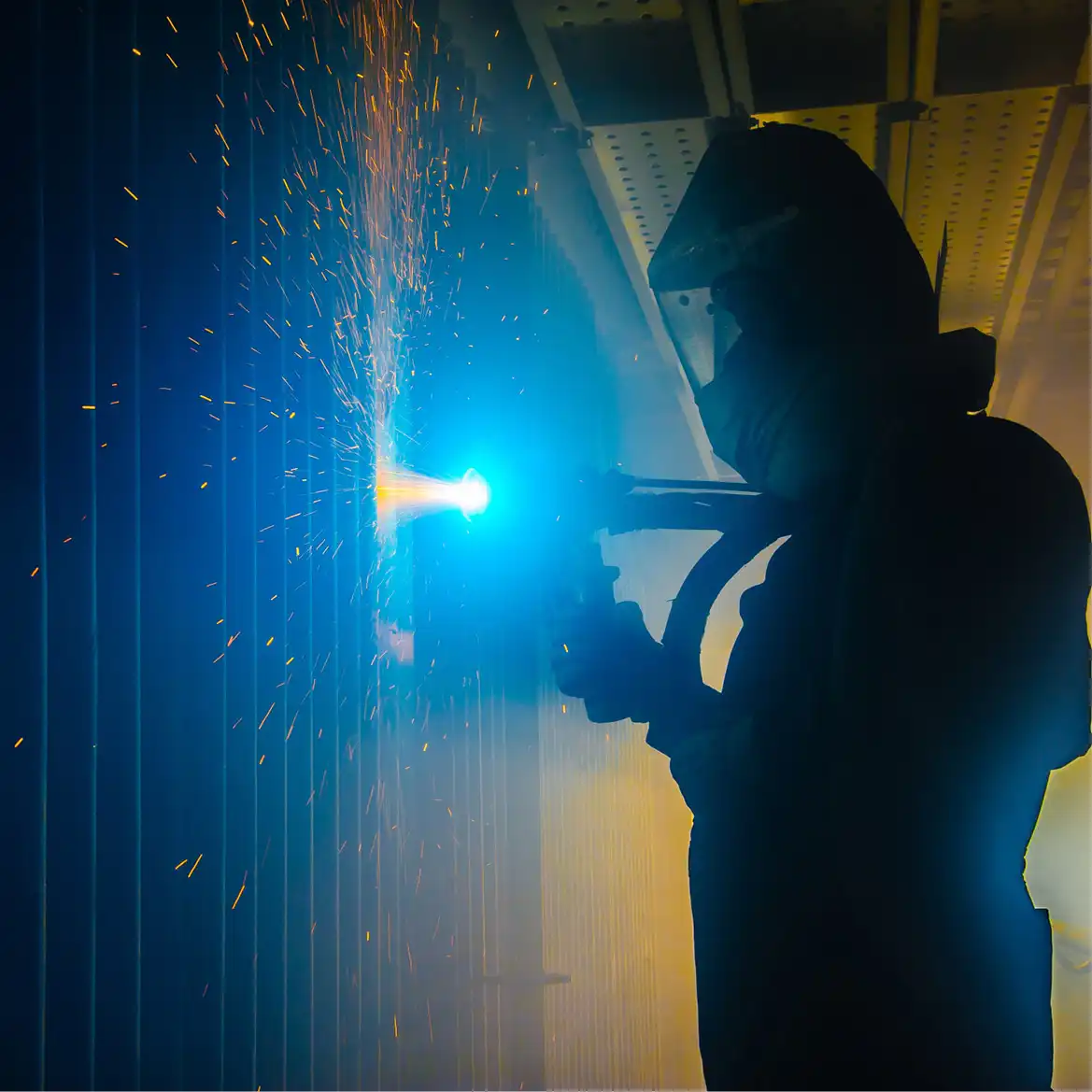Corrosion Under Insulation (CUI)
Online Application of a Thermal Spray Aluminium (TSA) Protection System to Downstream Petrochemical Process Plant and Pipework
IGS specialize in the onsite application of thermal spray systems, be they specialized High Velocity Thermal Spray (HVTS®) supersonic application of high nobility alloys internally on critical process equipment or the application of low nobility alloys using standard low velocity equipment in challenging circumstances. IGS are the largest onsite applicator of specialist thermal spray solutions in the world, with a global team of trained and certified project managers and technicians. We provide engineered solutions to challenging metal wastage problems, such as the application of a sacrificial Aluminium coating to the external surfaces of low temperature or cycling process equipment and pipework (sweating pipework), online, keeping the plant operating.
Thermal Spray Aluminium is a proven technology for Corrosion Under Insulation protection, specified for many years by the major oil companies such as Shell, ExxonMobil and Saudi Aramco, with a typical life expectancy of more than 25 years. The original application quality is critical and will have a direct correlation with the performance of the as applied corrosion barrier. The unmatched site experience of IGS in executing projects to strict quality standards in tight time schedules on shutdown / turnaround critical paths of downstream petrochemical assets, puts us in a unique position to provide the asset integrity manager with a turnkey, long-term solution to corrosion under insulation, applied outside of the shutdown on live plant, avoiding the requirement for extended shutdowns and reducing future plant turnaround scope and schedule. We spray metal alloy coatings in North America, Europe, Middle East, Africa, Asia, and other parts of the world.

Corrosion Under Insulation in the Refinery and Petrochemical Processes
Corrosion Under Insulation continues to cost the downstream petrochemical industry billions of dollars and is a common challenge for many production or asset integrity managers. CUI can proceed undetected until a loss of containment occurs, leading to an emergency plant shutdown required or even worse, a major incident. CUI is a risk at every process plant, across a huge range of process equipment.
Corrosion Under Insulation has been studied over many years at thousands of facilities and the operating equipment deemed to be most at risk is the plant operating at low temperatures (not cryogenic, but below the typical atmospheric temperature) or in cyclic operation (thermally cycling from cold too hot to cold etc.). Both these conditions lead to sweating service, where condensation forms on the equipment or pipework external surface, providing the liquid required to initiate corrosion activity if no protective barrier is in place. The rate of corrosion is then dependent upon many factors including the temperature, the presence of conductive salts (e.g. Chlorides) from the environment (e.g. coastal locations or offshore platforms) or leaching from insulation, the dwell time or duration of temperature cycles etc. etc.
CUI Mitigation Strategies
Preventing CUI can be achieved by many different corrosion management strategies. To prevent corrosion taking place the equipment designer or operator needs to ensure that the elements required for corrosion, commonly referred to as the Anode, Cathode, Metallic Pathway and Environment, are not allowed to develop. For Corrosion Under Insulation this can be done by controlling the environment (e.g. removing moisture), upgrading the substrate alloy etc. However, by far the most common method is utilizing a corrosion barrier or coating, to isolate the metal substrate from the environment and in addition to organic or non-metallic systems, the most common and widespread technology adopted is the application of Thermal Sprayed Aluminium.
Long-Term Protection Against Corrosion Under Insulation with Thermal Sprayed Aluminium (TSA)
Thermal Sprayed Aluminium (TSA) provides a proven, long-term solution for preventing Corrosion Under Insulation (CUI) and atmospheric corrosion in downstream process environments. When correctly applied and quality-controlled, TSA creates a continuous metallic barrier that isolates carbon steel substrates from moisture and electrolytes, effectively interrupting the corrosion cycle beneath insulation systems.
Unlike organic or non-metallic coatings that typically require renewal every five years, a single application of TSA can protect assets for more than 25 years. This performance translates to a markedly lower total cost of ownership, eliminating repeated coating and insulation replacement cycles and reducing maintenance-related downtime.
The protection TSA delivers is twofold. First, it acts as an impermeable physical barrier to moisture ingress. Second, the aluminium layer provides galvanic (sacrificial) protection, corroding preferentially to the underlying steel if the coating is locally damaged. This dual mechanism makes TSA one of the most reliable defenses against the initiation and propagation of corrosion under insulation.
To achieve this performance, precise surface preparation and controlled application are essential. TSA coatings are applied to white metal cleanliness (SA 3 / NACE 1) and to a specific surface roughness to ensure mechanical adhesion, following standards such as NORSOK M-501 and ISO 2063.
IGS has further advanced the technology by developing engineered online TSA application methods that enable coatings to be safely applied on live systems, including sweating pipework. This innovation allows operators to move CUI mitigation projects out of shutdown schedules—maintaining asset protection while maximizing uptime and production continuity.
TSA Advantages
- Tried and trusted corrosion barrier technology designed to stop corrosion under insulation and to protect the external surfaces of process pipework and equipment for extended periods (more than 25 years) – has been used in the downstream petrochemical industry for 50+ years.
- Effectively isolates the substrate material (typically carbon steel) from the corrosion environment (electrolyte or conductive liquid), acting as a protective corrosion barrier, to break the corrosion cycle – provides secondary protection of the carbon steel as a sacrificial anode.
- The Aluminium will galvanically corrode in preference to the Carbon Steel substrate due to its lower nobility. So, if localized mechanical damage occurs to the TSA coating, there is still galvanic protection against pitting corrosion of the carbon steel.

I’m here to help
Colin Bateman
IGS Subject Matter Expert
Free consultation with an IGS Subject Matter Expert
Leave us a note or start a chat with our operator to learn more about what we offer in corrosion and erosion prevention in WtE and Biomass circulating fluidized bed boilers.
